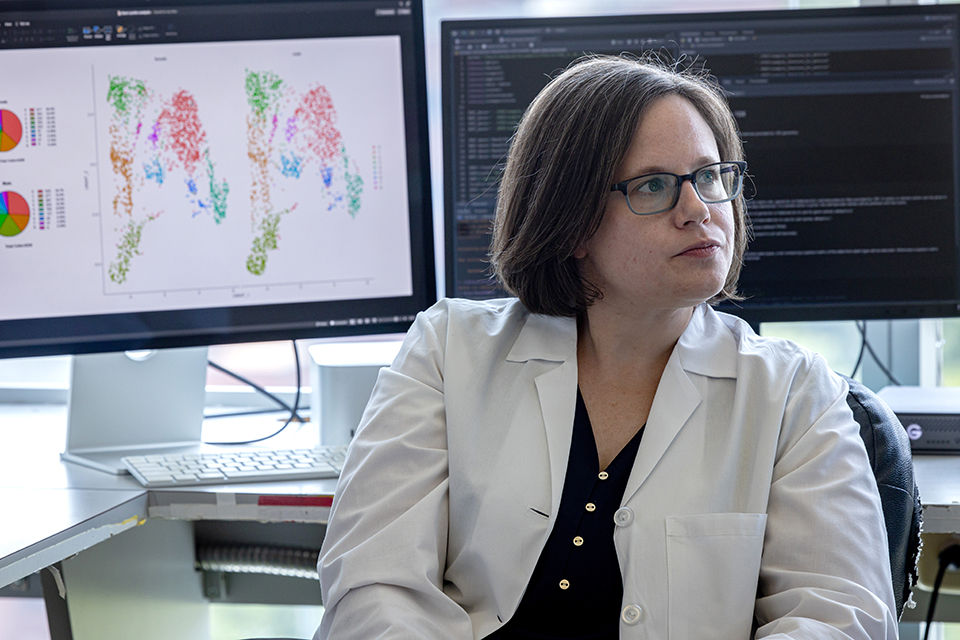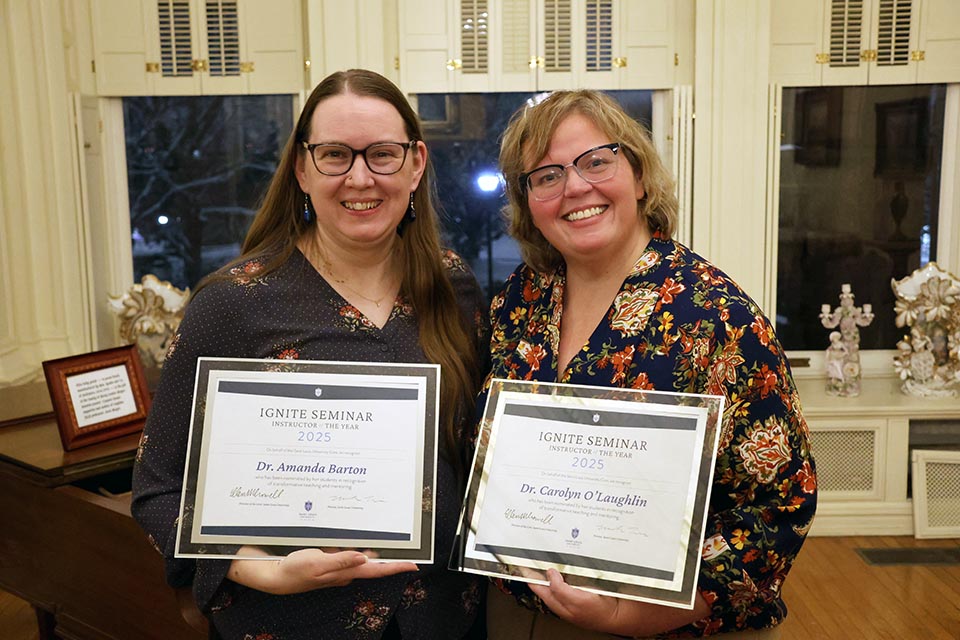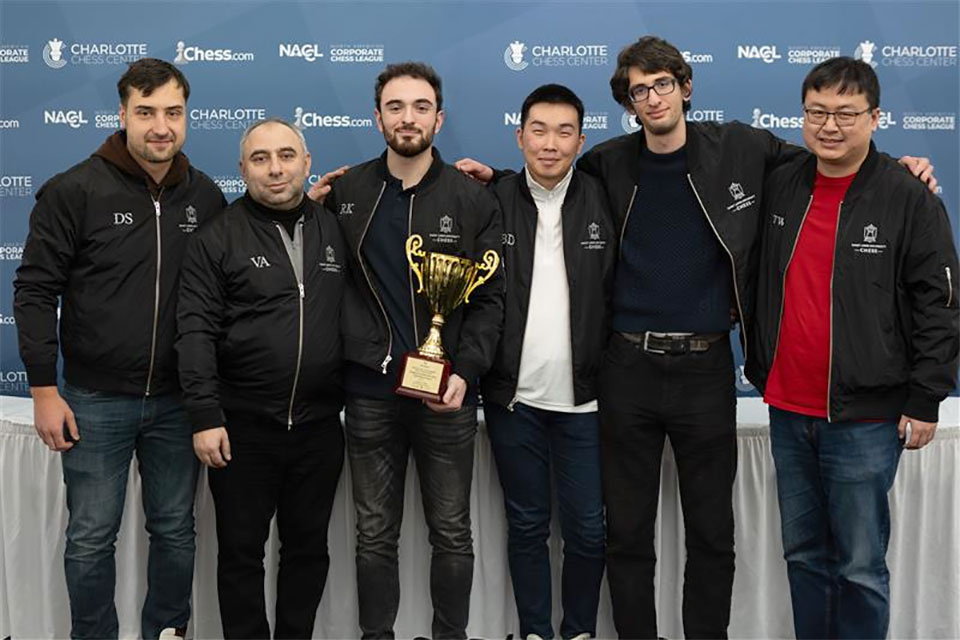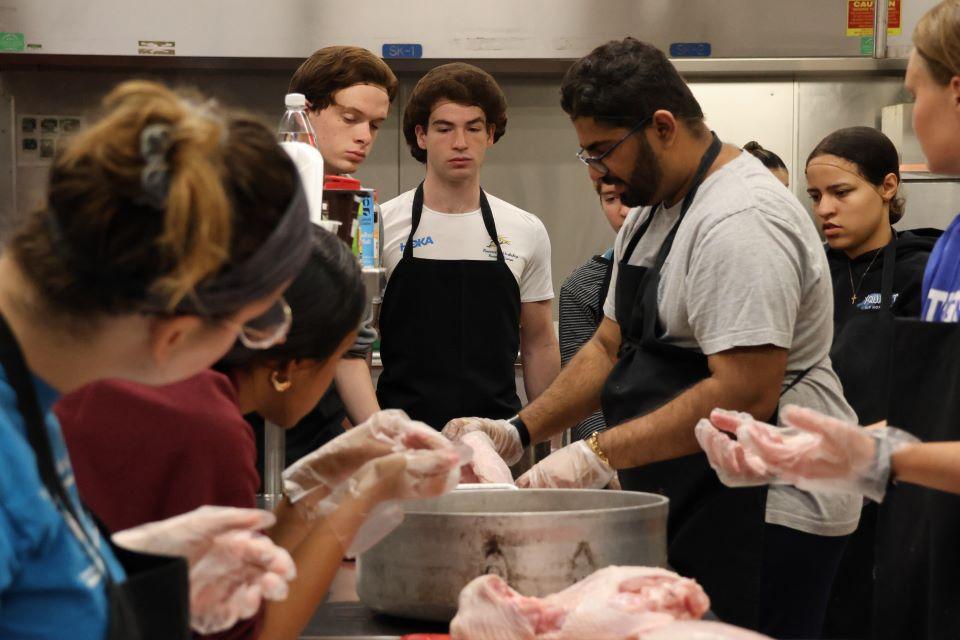SLU Researchers Identify Sex-Based Differences in Immune Responses Against Tumors
Researchers at Saint Louis University School of Medicine investigated differences in T-cell responses between male and female patients with lung cancer that may help direct future treatments. T-cell responses are part of the adaptive immune system, part of the body’s “smart system” that monitors for threats and fights them with customized defenses.
"Therapies that use the patient's immune system to fight their disease have a lot of potential to change how patients are treated. However, one of the biggest problems in the field right now is that these immunotherapies work well only in a small fraction of patients," Elise Alspach, Ph.D., assistant professor of molecular microbiology and immunology at SLU, senior author on the paper.

Elise Alspach, Ph.D., assistant professor of molecular microbiology and immunology, and her team identify sex-based differences in immune responses against tumors. Photo by Sarah Conroy.
Alspach and her team aimed to understand what determines good T-cell responses in patients, why some patients seem to have better T-cell responses than others, and why some patients respond well to immunotherapies. Research findings recently published in Cancer Immunology Research show that a protein called CXCL13 that has recently been linked to immunotherapy response in patients is more highly expressed in females than males. Additionally, Alspach and her team found that CXCL13 expression is a better marker of immunotherapy response in females than in males.

Elise Alspach, Ph.D., conducts research in a lab at Saint Louis University. Photo by Sarah Conroy.
Alspach and her team used single-cell RNA sequencing in human datasets to understand more about differences in how male and female immune systems respond to tumors. Single-cell RNA sequencing allows scientists to learn what’s happening inside individual cells. Using this technology, Alspach and her team determined that T-cells that infiltrate female tumors are highly activated and ready to identify tumor cells and kill them. They also noted immune suppressive T-cells present more frequently in male tumors than in female tumors.
Alspach and her team discovered that there is growing evidence that the male sex is associated with a better response to immunotherapy, which she said appears to contrast with their work and recently published papers showing that females mount stronger immune responses against their tumors.
"We currently don’t understand why males would respond better than females to immune targeting therapies, but this interesting juxtaposition highlights the need for more research into the variable of sex in the immune response against cancer," Alspach said.
Alspach said the potential of immunotherapy is revolutionary as it mediates tumor rejection in patients and induces long-term remission.
"When we get infected with a virus, the immune system generates a population of cells that can remember that virus and do a better job of eliminating it from your body, so the immune system does the same thing against tumors,” she said. “The memory response against that tumor partly generates long-term remissions that we see in patients treated with immunotherapies."
Before the advent of immunotherapies, Alspach said cancer treatments were hard on the body and not tumor-specific or, in the case of small molecule drugs that targeted specific proteins inside tumor cells, frequently become resistant to therapies. Current immunotherapies are typically much better tolerated in more patients, and patients can maintain a higher quality of life because the immune system can be educated to specifically target the tumor rather than all the tissues in the body.
Because immune responses against tumors are different between the sexes, Alspach and her colleagues concluded that it makes sense to potentially design different treatments for male versus female patients. In the future, she hopes more appropriate therapeutic strategies will be devised to target the pathways that mediate better tumor control in ways that benefit individual patients.
This research was possible thanks to a recent investment in single-cell RNA sequencing technology at Saint Louis University, allowing researchers to bring us closer to new cures.
Additional authors include Richard J. DiPaolo, Ph.D.; Ryan M. Teague, Ph.D.; Michelle Brennan, Ph.D.; David DeBruin; Chinye Nwokolo; Katey S. Hunt; Alexander Piening; Maureen J. Donlin; and Stephen T. Ferris, Department of Molecular Microbiology and Immunology, Saint Louis University School of Medicine.
Latest Newslink
- University Core Honors Ignite Seminar InstructorsTwo Ignite Seminar instructors have been recognized with the 2025 Ignite Instructor of the Year Award. At a ceremony Tuesday night in Cupples House, Carolyn O'Laughlin, Ph.D. (Education) and Amanda Barton, Ph.D. (RISE Counselor) were honored by the University Core after being nominated by students in their Ignite Seminars.
- Sharing Throughout the Season: Ways to Give Back at SLUThis holiday season, Saint Louis University is highlighting organizations that could benefit from the gift of time or donations, including the University's annual Blue Santa toy drive.
- SLU Wins Collegiate Chess League Back-to-Back SeasonsThe SLU Chess Team won back-to-back Collegiate Chess League titles, securing the Fall 2025 season championship. This win is SLU's fifth Collegiate Chess League title in the last six seasons.
- TurkeyPalooza Food Drive Helps Provide a Thanksgiving Meal to Individuals, Families in NeedTurkeyPalooza, the annual Campus Kitchen food drive and Thanksgiving food prep event, resulted in 200 individual Thanksgiving meals and 40 meal-prep boxes for families in the St. Louis community.
- Saint Louis University's Moore Honored by Missouri Lawyers WeeklySenior Associate General Counsel Christina Moore, J.D., has been recognized by Missouri Lawyers Weekly for her work as in-house counsel at a non-profit or government organization. Moore (Law '02) was honored at the In-House Counsel Awards, an event designed to recognize attorneys from different sectors for their contributions and work.
- SLU Study Shows Heat Can Cut Insect Survival but Boost ReproductionRising global temperatures are changing the rules for survival—and reproduction—for many species. A new study from Saint Louis University reveals that predicting which species will persist under climate change is more complex than focusing solely on survival.













